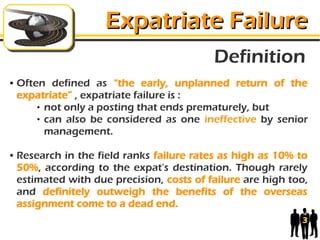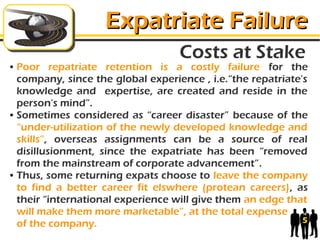Expatriation Key Success Factors
- 2. AGENDA Expatriation Failures Core Reasons Key factors to make an expatriate assignment successful 2
- 3. Expatriate Failure Definition ● ● Often defined as “the early, unplanned return of the expatriate” , expatriate failure is : not only a posting that ends prematurely, but can also be considered as one ineffective by senior management. Research in the field ranks failure rates as high as 10% to 50%, according to the expat's destination. Though rarely estimated with due precision, costs of failure are high too, and definitely outweigh the benefits of the overseas assignment come to a dead end. 3
- 4. Expatriate Failure 3 Distinct Cases Expatriation is considered as a failure in three distinct cases : ● ● ● If the assignment terminates prematurely, to the double expense of the company (economic loss), and the expatriate (and family – human expense), but also : If the overseas experience proves to be unprofitable for the company , when the assignment comes to due term, but the expatriate's mission isn't successully fulfilled (misadjustment, and “wrong fit” case) If lack of appropriate organizational support , during and/or after the overseas assignment, leads the expatriate to leave the company. 4
- 5. Expatriate Failure Costs at Stake Poor repatriate retention is a costly failure for the company, since the global experience , i.e.“the repatriate's knowledge and expertise, are created and reside in the person's mind”. ● Sometimes considered as “career disaster” because of the “under-utilization of the newly developed knowledge and skills”, overseas assignments can be a source of real disillusionment, since the expatriate has been “removed from the mainstream of corporate advancement”. ● Thus, some returning expats choose to leave the company to find a better career fit elswhere (protean careers), as their “international experience will give them an edge that will make them more marketable”, at the total expense 5 of the company. ●
- 6. AGENDA Expatriation Failures Core Reasons Key factors to make an expatriate assignment successful 6
- 7. Core Reasons Individual Factors Failure for an overseas assignment may be due to organizational, or nonwork factors. First, early returns can result from individual characteristics, ranging from personality to misadjustment to the mission. On a very personal basis : ● Expats sometimes lack maturity, adaptability to different contexts, and ● cultural flexibility, and a global mindset is no innate characterictic. ● Some out-and-out go-getters also choose expatriation for the wrong reasons or intentions (money, adventure, exotism, career loophole...), and fail to meet the 7 very requirements of the assignment.
- 8. Core Reasons Side-Effect Factors Family pressures are the other set of failure factors in the individual sphere, as spouses and families may fail to adjust ( U-Curve and Culture Shock). ● Some corporate data give total marriage breakdown rates in specific locations “up to 50%, due to the stress of offshore postings”*. ● 8 * Challenges in Expatriate Postings -Main reasons for Expatriate Failures – www.chalre.com
- 9. Core Reasons Work-Related Factors As for organizational, or work-related factors of failure, they range : ● from the bad corporate habit of basing selection on technical competencies only, ● to the lack of adaptability screening, ● lack of support and networking, and ● bad person-job match, overlooking responsibility overload , i.e. neglecting the assessment of abilities to cope with larger overseas responsibility (or adequate prejob training). 9
- 10. AGENDA Expatriation Failures Core Reasons Key factors to make an expatriate assignment successful 10
- 11. Key Success Factors Success Predictability Factors For all these reasons, overseas assignments need to be well thought of, and really ought to depend on a systemized corporate expatriate management process. The first key factor of sucess is : ● to select assignees, not only on a technical or strictly professionnal basis, but ● by identifying the five factors of success predictability : job knowledge and motivation, relational skills, flexibility / adaptability, extra-cultural openness, and family situation”. ● At this stage, adaptability screening is also preponderant (overseas assignment inventory). 11 Overseas Assignment Inventory available at : http://www.prudential.com/view/page/public/14394
- 12. Key Success Factors Relevant Information & Training Second , both expatriate and spouse need to receive : ● relevant information (realistic previews, improved orientation), ● together with cultural and language training ==> to cope with the expected culture shock. As family stress is to be anticipated, on a very private level this time, candidates must get aware that they will go through a very demanding experience, where “strong bonds of closeness” between expat spouses are definitely “together-we're-strong” key factors of success, and stress smoothers. 12
- 13. Key Success Factors Financial Support On the financial front, improved packages will most certainly help : benefits to cope with material difficulties, ● standard of living discrepancies, ● or the need for regular flights back home to visit family and help stand homesickness. ● 13
- 14. Key Success Factors Organisational Support In the professional field, it is important that the firm should find a way to keep the expatriate “in the corporate loop”, by developing oriented networking, to avoid the terrible results “out of sight out of mind” methods. Requiring and providing regular feedback , ● together with setting SMART individual goals, ● enable the overseas assignee to stay in the loop, keep their motivation, and fuel professional satisfaction. 14
- 15. Key Success Factors Further Opportunities Of course, another KSF (key success factor) is to provide the expats with : opportunities for further training and improvement (development) , ● and the assurance that their overseas assignment will be recognized as a valuable experience on their return, and will not meet a repatriation dead end (career). ● 15
- 16. BIBLIOGRAPHY Human Resource Management Gary Dessler Revisiting Repatriation Concerns Revisiting Repatriation Concerns : Organizational Support Versus Career & Contextual http://www.palgrave-journals.com/jibs/journal/v38/n3/abs/8400273a.html Influences Mila Lazarova Jean-Luc Cerdin 16
















